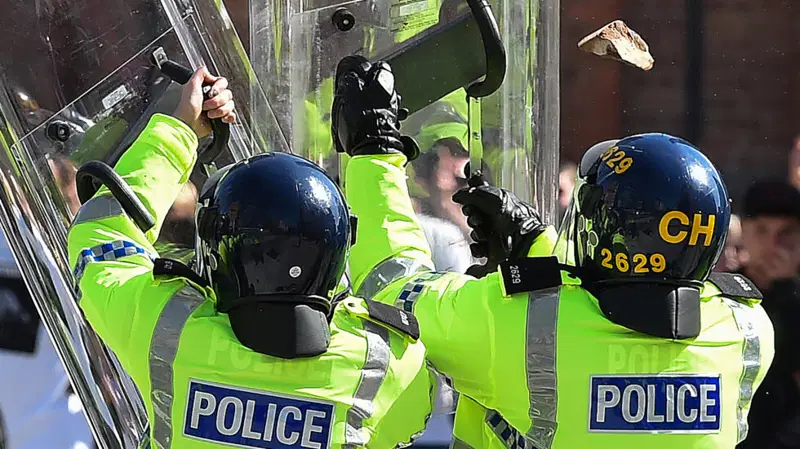
UK authorities are under intense pressure to quell the nation’s most severe rioting in over a decade, following a week of disturbances linked to child murders and far-right agitators.
Unrest began after a mass stabbing incident last week that resulted in the deaths of three young girls, spreading to multiple towns and cities as anti-immigration demonstrators clashed with police.
The violence poses a significant challenge for newly elected Prime Minister Keir Starmer, who secured a landslide victory over the Conservatives just a month ago. Commenting on the situation, Starmer said, “Thugs are hijacking our nation’s grief to sow hatred.”
Around 90 individuals were arrested during skirmishes at far-right rallies in cities including Liverpool, Manchester, Bristol, Blackpool, Hull, and Belfast. Rioters threw bricks, bottles, and flares at police, injuring several officers, while looting and burning shops. Protesters shouted anti-Islamic slurs and clashed with counter-protesters in various locations.
“We’ve had riots and clashes of this nature, but they have been pocketed in particular areas of the country. We’re now seeing it flooding across major cities and towns,” said Tiffany Lynch of the Police Federation of England and Wales.
The government asserts that the police have “all the resources they need” to address the disorder. Justice minister Shabana Mahmood assured that “the whole justice system is ready to deliver convictions as quickly as possible,” while policing minister Diana Johnson emphasized, “The rioting will not be tolerated,” promising “penalties and consequences” for those involved.
The disturbances are the worst seen in England since the 2011 riots, which followed the police killing of a mixed-race man in north London. Saturday marked the fourth consecutive day of unrest in several towns and cities, ignited by the tragic knife attack in Southport, near Liverpool.
The suspect, 17-year-old Axel Rudakubana, has been charged with multiple counts of murder and attempted murder following the attack at a Taylor Swift-themed dance party. The victims include Bebe King, six, Elsie Dot Stancombe, seven, and Alice Dasilva Aguiar, nine, with another ten people injured.
Police have attributed the violence to supporters and associated organizations of the English Defence League, an anti-Islam group with links to football hooliganism. Agitators targeted mosques in Southport and Sunderland, prompting Islamic centers to enhance security measures.
The rallies have been promoted on far-right social media channels under the banner “Enough is enough,” with demonstrators waving English and British flags and chanting slogans like “Stop the boats,” a reference to migrants arriving in Britain from France.
Anti-fascist groups held counter-rallies in many cities, including Leeds, where they chanted, “Nazi scum off our streets” in response to the far-right protesters’ chants of “You’re not English anymore.”
Not all of the estimated 30 gatherings on Saturday turned violent, with some participants expressing legitimate grievances. “People are fed up with being told you should be ashamed if you’re white and working class but I’m proud white working class,” said 41-year-old Karina from Nottingham.
Commentators suggest the demonstrators, spurred by online influencers, may feel emboldened by the recent rise of anti-immigration sentiment in British politics. The Reform UK party captured 14 percent of the vote in the last election, marking a significant shift.
Policing minister Johnson assured that the government will do “whatever it takes” to bring perpetrators to justice, including the possibility of courts sitting overnight as they did during the 2011 riots.
The government continues to monitor the situation closely, with heightened security and resources deployed to prevent further escalation.








